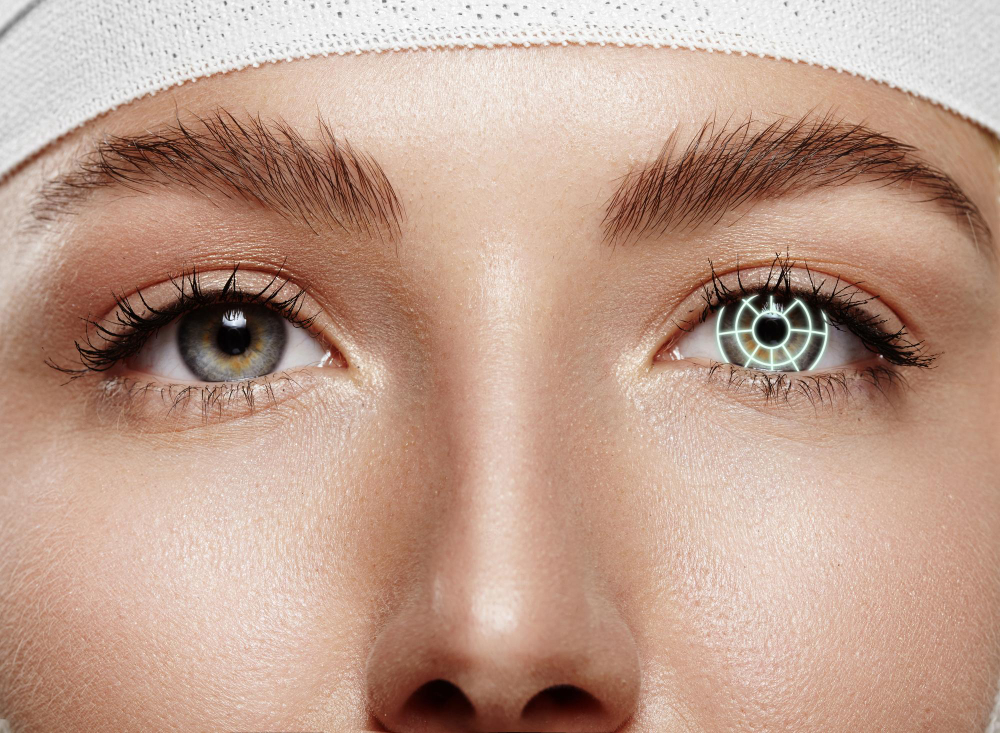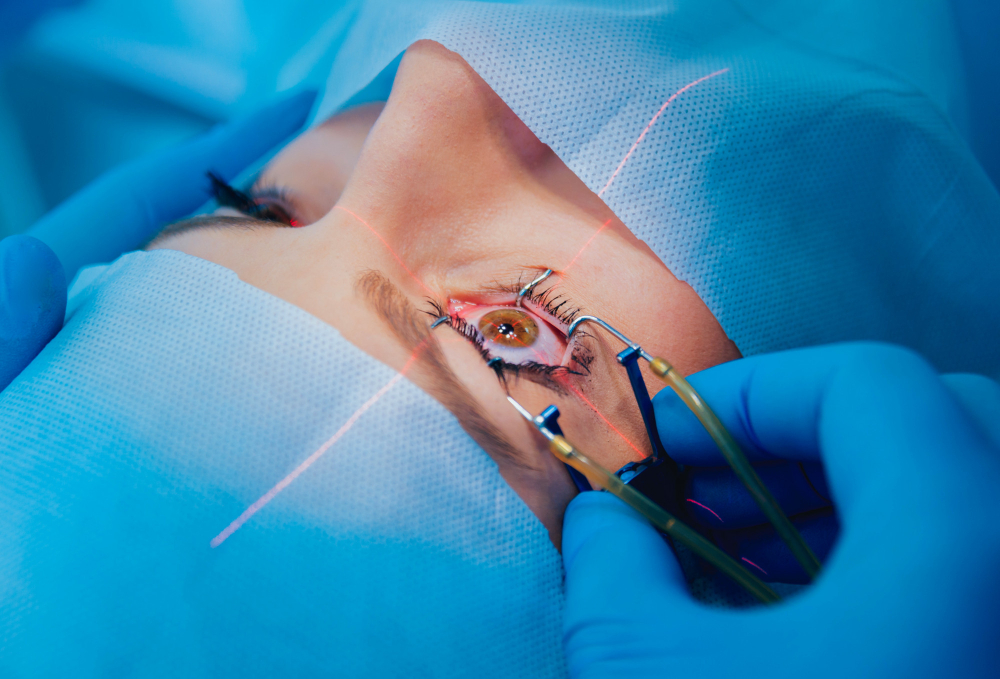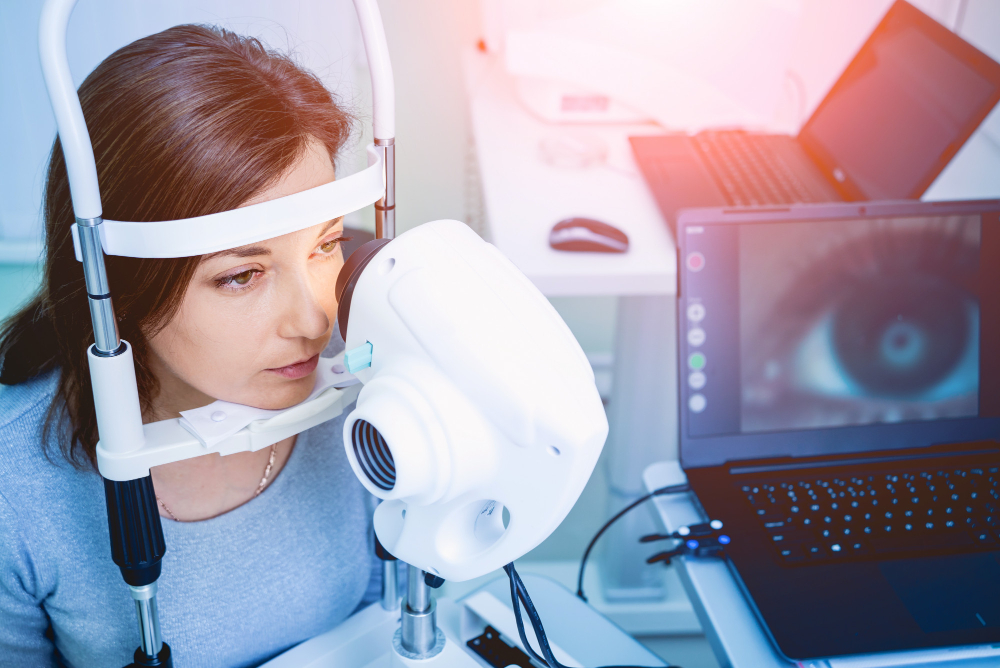LASIK Eye Surgery
LASIK is a type of surgery that involves the use of an excimer laser to reshape the cornea, which is the transparent covering at the front of the eye. The procedure can be carried out using a mechanical device called a microkeratome or a laser device known as a laser keratome to create a flap in the cornea. This results in a permanent change to the shape of the cornea.

Why Is LASIK Done?
If your vision is blurry, it means that the light is not properly focusing on your retina. This is referred to as a refractive error by medical professionals. There are different forms of refractive errors including:
- Myopia, also known as nearsightedness, causes objects at a distance to appear blurry while items that are close to you can be seen clearly.
- Hyperopia, also known as farsightedness, results in the ability to see distant objects more distinctly, but objects that are closer appear unclear.
- Astigmatism causes blurred vision due to the distorted shape of the eye.
Is LASIK a permanent solution for improving your eyesight?
LASIK alters the cornea’s shape permanently as a means of improving vision to a normal or near-normal level. Nevertheless, as one advances in age, natural changes can occur in the eyes, causing changes in vision even after LASIK. Such changes are typical as part of the aging process, and individuals typically begin experiencing presbyopia around age 40, eventually leading to the necessity of using reading glasses for close-up vision at some stage.
What qualities and criteria make someone a suitable candidate for LASIK surgery?
In order to undergo LASIK surgery, there are specific criteria that must be met. These are a few examples:
- Ideally, individuals who have stopped experiencing changes in their vision should be at least 21 years of age, but it is necessary to be at least 18 years old.
- There shouldn’t be a significant alteration in your eye prescription over the past year.
- LASIK can only be used to correct certain types of refractive errors.
- Your overall eye health should generally be in good condition and your corneas must be healthy and sufficiently thick.
- It is important to have practical beliefs regarding the capabilities and limitations of LASIK surgery in regards to your vision.

What are the steps I need to take to get ready for LASIK eye surgery?
You will first have a meeting with either a coordinator or an eye surgeon prior to having LASIK. During this meeting, you will be informed about what to expect before and after the procedure. There will also be a discussion about your medical history and a thorough eye exam will be conducted. This may involve tests to check the thickness of your cornea, refraction, and eye pressure. Your corneas may also be mapped and your pupils dilated. The surgeon will be available to answer any queries you have before scheduling you for the surgery.
If you usually wear hard gas-permeable contact lenses, abstain from wearing them for a minimum of 3 weeks before your assessment. If you use other kinds of contact lenses, don’t wear them for at least 3 days before the evaluation. Make sure to bring your glasses with you so that the doctor can examine your prescription.
On the day of your surgical procedure, consume a small meal beforehand and ensure that you take all of your prescribed medications. Avoid wearing eye makeup or large hair accessories that may obstruct your head position. In case you feel unwell on that day, make sure to contact your doctor’s office for advice.
What happens during the surgery?
During LASIK, a refractive surgeon will:
- Instill drops into your eyes that will desensitize them, thus preventing any sensation of discomfort.
- To prepare for the procedure, a suction ring and eyelid speculum will be applied to your eye. These instruments will hold your eye in place and prevent it from blinking, without causing any discomfort. You may experience a sensation of pressure on your eyelid, as if someone were pushing down on it, and your vision may become temporarily blurred.
- Create a slender slice in your cornea known as a corneal flap. Your surgeon then raises and bends the flap in a manner similar to turning a page in a book.
- When undergoing a laser eye surgery, you will be requested to concentrate on a light directed towards your eye. Meanwhile, the surgeon will utilize a laser to change the shape of your cornea and you may hear a clicking noise. Additionally, there could be an unfamiliar odor that would not harm your eyes as it is caused by a chemical reaction from the laser that is reshaping your cornea. Additionally, the positioning of your eye will be evaluated constantly at a rate of 500 times per second. If your eye moves excessively, the laser will stop.
- Replace the corneal flap back to its original position, which will immediately start reattaching and further heal while you are away.
Vision after LASIK

Approximately 90% of individuals who undergo LASIK surgery achieve vision ranging from 20/20 to 20/40 without the need for glasses or contacts.
Understanding that presbyopia cannot be fixed by LASIK is crucial. Presbyopia, which refers to the natural deterioration of vision when focusing on near objects as one ages, cannot be corrected through refractive surgery. Regardless of whether or not one undergoes refractive surgery, people with excellent distance vision will still require reading glasses when they reach the age of approximately 40.
To alleviate presbyopia, some individuals opt for LASIK surgery to obtain monovision. Monovision is achieved by leaving one eye with a slight nearsightedness while adjusting the other eye to focus on distant objects. The brain adjusts to this new vision, with the nearsighted eye utilized for close up work and the other for viewing things far away. However, monovision may not be suitable for everyone. To determine if you can adapt to this correction, it is recommended that you try it first with contact lenses.
Treatment in Türkiye:
The medical staff of surgical teams, doctors and consultants in Rehab Türk can provide the best treatment options and free consultations – by striving to keep abreast of the latest medical technologies and methods.

